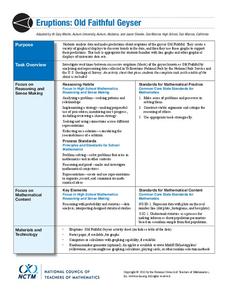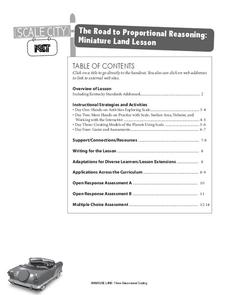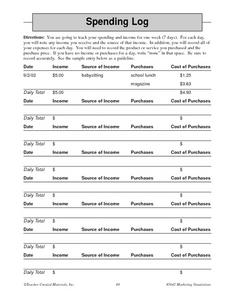Curated OER
Multiplying by 10
Multiplying by 10 is simple, but do your scholars know the trick? They look at four examples; if you haven't learned this yet, see if they notice a pattern in these answers. They multiply 70 numbers by 10. Most are two-digit, but a few...
Curated OER
Uses of Coal
An interesting series of puzzles and word games are available in this multi-page collection, which focuses on coal. Learners practice math and language arts skills as they solve the puzzles, and learn many facts about coal at the same time.
Curated OER
Explore Subtraction
Learnersare given 26 tables and graphs in which they must fill in missing numbers and graph equations. They subtract a given value of x from a constant number, and use a number line to subtract larger numbers from smaller ones resulting...
DK Publishing
Choosing the Operation
Which symbol goes here? Mathematicians often get confused between division and multiplication, so drill these skills with them. They examine 48 number sentences without a symbol, writing either the multiplication or division operation...
Curated OER
Conversion Tables
Here are some practical conversion scenarios for scholars to figure out. They examine an example table converting cents to dollars before completing two of their own. For the first, learners convert weeks to days. Some of these are done...
DK Publishing
Sneaky Snake: Numbers
Find the numbers that the sneaky snakes are hiding! Using a number table, primaries determine which numbers are covered up by snakes. They write in the numbers next to the matching snake below the table, which reinforces both...
National Council of Teachers of Mathematics
Eruptions: Old Faithful Geyser
How long do we have to wait? Given several days of times between eruptions of Old Faithful, learners create a graphical representation for two days. Groups combine their data to determine an appropriate wait time between eruptions.
Curated OER
Multiples
A great worksheet for scaffolding critical thinking about mathematical concepts. This resource provides students with a brief explanation of multiples followed by 29 practice problems which gradually increase in difficulty. Several...
DK Publishing
Numbers 1 to 20
Practice writing numbers with fun kites. Kindergartners will rise to the highest height as they match the numbers to their correct written forms: 11 to eleven, 14 to fourteen, etc. Use this resource as a class activity or as a review...
Concord Consortium
Betweenness III
Don't let a little challenge get between your pupils and their learning! Scholars compare two absolute value functions to recognize patterns and use them to build their own functions with outputs that are between the given. They then...
DK Publishing
Counting Caterpillars
These caterpillars each have a number sequence printed on their segmented bodies, but some numbers are missing! Look at the completed caterpillars as an example, asking kids to notice a possible pattern. They should observe that the...
Curated OER
Writing Linear Equations in Different Forms
Can your class write linear equations three different ways? Here is a study guide that includes slope-intercept, standard, and point-slope forms. Learners are given the slope and a point on the line, or two points and are asked to write...
Illustrative Mathematics
Eight Circles
We are used to finding the area of a circle by plugging the radius into an equation. Here, learners are required to go further to find multiple areas and calculate the difference. They must detect a pattern in order to figure out the...
Kentucky Educational Television
The Road to Proportional Reasoning
Just how big would it really be? Young mathematicians determine if different toys are proportional and if their scale is accurate. They solve problems relating scale along with volume and surface area using manipulatives. The...
Computer Science Unplugged
Twenty Guesses—Information Theory
How do we determine how much information to include and what can be left out? By playing a game of 20 questions, the class generates the best strategies for finding a number. They then move on to guessing the next letter in a short...
Willow Tree
Factoring Polynomials
Young mathematicians discover trees organize more than just families — they help factor, too. The activity begins with factor trees and develops slowly to factoring by grouping and special patterns.
Concord Consortium
Intersections II
How many intersections can two absolute value functions have? Young scholars consider the question and then develop a set of rules that describe the number of solutions a given system will have. Using the parent function and the standard...
Curated OER
Spending Log
In this money management worksheet, students will track their spending and income for one week. After tracking their income and expenses, students will complete 6 short answer questions about the results.
Curated OER
Con-tents of the Tents
Fill in the missing numbers on this worksheet. Pupils display the missing consecutive numbers between the tents on the ends of each row. They also match the missing consecutive number for each group of elephants. Students solve six...
Curated OER
Applications of the Pythagorean Theorem - Magnetism
Middle and high schoolers use the Pythagorean Theorem to complete a table showing with the magnetic field strengths in given cities. They find the average value of the Earth's magnetic field and plot one of the three-dimensional values...
Illustrative Mathematics
The Locker Game
Here is a learning activity that incorporates a classic puzzle in mathematics. Young mathematicians are guided through a series of statements that describe rounds of pupils opening and closing lockers. The first person opens all 20...
Illustrative Mathematics
The Stamp Collection
By using language like "half of the stamps," children are exposed to patterns in arithmetic that requires solving a two-step word problem. This type of language opens a new door for transitioning learners toward understanding fractions...
Agile Mind
Transforming Graphs of Quadratic Functions
In the activity on this webpage, learners use interactive graphing technology to investigate transformations of graphs. In the first part of the task, they look at the graph of a quadratic function with coordinates of a few points...
Math Flix
Countdown Challenge: Equivalent Expressions
Young mathematicians solve and complete eight different problems that include writing several equivalent expressions. They determine the number of tiles required to border around a square pool of the given dimensions. This terrific...

























